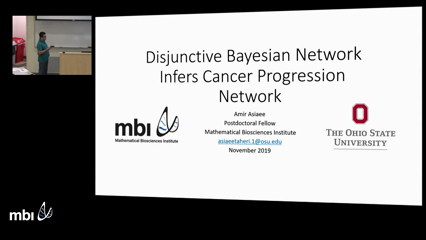MBI Videos
Amir Asiaee T.
-
 Amir Asiaee T.Cancer is an evolutionary process that can be modeled as a sequence of fixation of genetic alterations throughout the tumor cell population. Each new driver alteration confers a selective growth advantage to the cell and sweeps through the population, which results in clonal expansion. But the order in which accumulating alterations fixate in tumors is not arbitrary and is restricted by the type of advantage that is required to lay the ground for later ones. Perhaps the most famous Bayesian Network model of cancer progression is Conjunctive Bayesian Network (CBN) where the assumption is that all parent alterations must be present in order for a child aberration to occur. The assumption of CBNs is restrictive because a single advantageous hit is usually enough for clonal expansion. We proposed the Disjunctive Bayesian Network (DBN) in which each alteration can occur if at least one of its parents has happened before. DBN generalizes CBN and therefore has a larger search space but we have designed a scalable algorithm to infer DBN from cross-sectional data. I present our specific findings for the order of mutations in melanoma.
Amir Asiaee T.Cancer is an evolutionary process that can be modeled as a sequence of fixation of genetic alterations throughout the tumor cell population. Each new driver alteration confers a selective growth advantage to the cell and sweeps through the population, which results in clonal expansion. But the order in which accumulating alterations fixate in tumors is not arbitrary and is restricted by the type of advantage that is required to lay the ground for later ones. Perhaps the most famous Bayesian Network model of cancer progression is Conjunctive Bayesian Network (CBN) where the assumption is that all parent alterations must be present in order for a child aberration to occur. The assumption of CBNs is restrictive because a single advantageous hit is usually enough for clonal expansion. We proposed the Disjunctive Bayesian Network (DBN) in which each alteration can occur if at least one of its parents has happened before. DBN generalizes CBN and therefore has a larger search space but we have designed a scalable algorithm to infer DBN from cross-sectional data. I present our specific findings for the order of mutations in melanoma.
